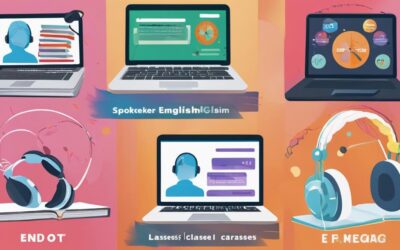When it comes to mastering the Chaus English Speaking Course, many students struggle to make significant progress. Despite their best efforts, they often find themselves stuck in a rut, unable to articulate their thoughts with confidence and clarity. However, with the right approach, achieving fluency in English speaking is within reach. By focusing on three essential tips, students can overcome common obstacles and tap into their full potential. But what are these vital strategies, and how can they be effectively implemented to achieve success in the Chaus English Speaking Course?
Build a Strong Foundation

With a strong foundation in place, learners can confidently navigate the complexities of the English language, thereby setting themselves up for long-term success.
A solid foundation in English speaking is built on a thorough understanding of grammar, vocabulary, and pronunciation. Grammar provides the framework for constructing coherent sentences, while vocabulary expands the learner's ability to express themselves effectively.
Pronunciation, often overlooked, is vital for conveying meaning and being understood by others.
A well-structured English speaking course should prioritize these fundamental components, providing learners with an in-depth understanding of each.
This includes mastering basic sentence structures, common verb tenses, and essential vocabulary related to everyday topics.
In addition, learners should focus on developing good pronunciation habits, such as correct intonation, stress, and rhythm.
Practice Like a Pro
Building on a strong foundation, it's now time to put language skills into action through dedicated practice.
This is where the rubber meets the road, and consistent effort yields tangible results. To practice like a pro, set specific, measurable, and achievable goals for each practice session.
Identify areas that require improvement, such as pronunciation, vocabulary, or grammar, and create a tailored plan to address these weaknesses.
Use a variety of materials, including audiobooks, podcasts, and videos, to expose yourself to different speaking styles, accents, and intonation patterns.
Engage in active listening, repeating what the speaker says to improve your pronunciation and intonation. Record yourself speaking and listen to the recordings to identify areas for improvement.
Finally, practice with a language exchange partner or tutor who can provide feedback on your progress and help you stay motivated.
Focus on Fluency First

Your language skills are only as strong as your ability to communicate fluently, so mastering fluency first is vital.
Fluency is the foundation upon which all other language skills are built. Without it, even the most grammatically correct sentences can sound stilted and unnatural.
When you focus on fluency, you're not just working on speaking quickly or correctly, but also on conveying meaning and ideas smoothly.
To achieve fluency, prioritize practicing speaking over other language skills like reading and writing.
Set aside time each day to engage in conversations, whether it's with a language exchange partner, a tutor, or even yourself. Focus on speaking at a natural pace, pausing briefly to gather your thoughts, and using filler words like "um" or "ah" to buy time.
As you practice, pay attention to your intonation, rhythm, and stress patterns. Record yourself speaking and listen to identify areas for improvement.
Frequently Asked Questions
Can I Learn English Speaking Without a Language Exchange Partner?
While a language exchange partner can be beneficial, it is not an absolute necessity for learning English speaking. Alternative options, such as audio recordings, online tutorials, and self-practice, can still facilitate effective language acquisition and improvement.
How Do I Overcome Fear of Speaking in Front of Others?
To overcome the fear of speaking in front of others, start by acknowledging its normalcy and identifying the source of your anxiety. Practice self-compassion, focus on your message rather than your nervousness, and gradually increase your audience size to build confidence.
Are There Any Specific English Accents I Should Focus On?
When learning English, mastering the skill to familiarize yourself with various accents is crucial to enhance comprehension and adaptability. Focus on neutral accents like Received Pronunciation (RP) or General American, as they are widely understood and used in international communication.
Can I Learn English Speaking Solely Through Self-Study?
While self-study can be an effective way to improve English speaking skills, it is often limited by the lack of interaction, feedback, and authentic language use, making it challenging to achieve fluency solely through self-study.
How Do I Handle Grammar Mistakes During Conversations?
When traversing conversations, gracefully acknowledge grammar mistakes by pausing, correcting yourself, and continuing the conversation. This showcases self-awareness and a willingness to improve, allowing you to maintain confidence and flow in your communication.
Conclusion
Mastering Chaus English Speaking Course 3 Essential Tips
Build a Strong Foundation
A solid grasp of grammar, vocabulary, and pronunciation is vital for success in the Chaus English Speaking Course. This foundation must be built upon a thorough understanding of linguistic structures, a broad range of vocabulary, and accurate pronunciation.
Practice Like a Pro
To excel in the course, it is essential to practice speaking with specific goals in mind and utilizing varied materials. This includes setting achievable targets, engaging in regular speaking exercises, and incorporating diverse resources to enhance skills.
Focus on Fluency First
Fluency is a pivotal component of effective communication. Prioritizing fluency enables the smooth transmission of ideas and adopting natural speech patterns facilitates this goal. By focusing on fluency, individuals can guarantee that their message is conveyed efficiently and effectively.
In conclusion, mastering the Chaus English Speaking Course requires a strategic approach that includes building a strong foundation, practicing like a pro, and focusing on fluency first.




0 Comments